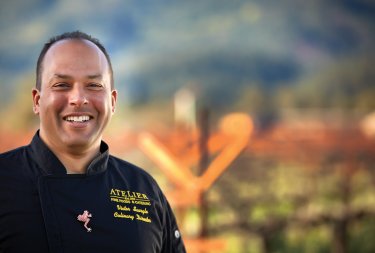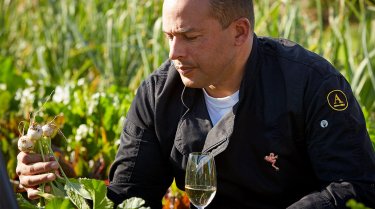You better be on your game if you’re going to keep up with Chef Victor Scargle. For one thing, his resume spans 30 years, dropping names such as Jardinere, Gramercy Tavern, Go Fish, The Culinary Institute of America (CIA) and Julia’s Kitchen in Napa, Calif. While he was at the latter, the San Francisco Chronicle awarded it an impressive 3.5-star review; hardly surprising, given the fact that the publication once dubbed Victor a rising star.

Perhaps even more remarkable, though, is the breadth of his interests and expertise. He currently serves as culinary director of the Boisset Collection, a family-owned company that includes “historic and unique wineries” and Atelier Fine Foods, “an epicurean boutique in the heart of Yountville.” He’s into biodynamic farming, cycling, seasoning food while it’s cooking (not when it’s on the table) and the apple of his eye – his 13-year-old son.
First Course The Early Years
“Food became important right away,” said Victor, whose mother wasn’t a natural in the kitchen. He nevertheless was drawn to it from his earliest days. Food, flavor and texture fascinated him as a young boy. An apricot tree near his home in Aptos, Calif., was a big draw. “I remember eating fresh apricots until my stomach ached,” he said.
When Victor was 13, he went to work as a dishwasher in a steak house. “It was a place where your meat was brought to you raw on a wooden board before it was grilled,” he said. He liked the environment so much, he moved on to another local restaurant as a prep cook. He was eventually promoted to line cook, and on many nights, he was running the restaurant.
These days, Victor is a proponent of choosing food that’s in season. The flavors will be best then, he insists. When that’s not possible, freezing is a good option. “Sometimes the flavors are even better because foods are frozen when they’re too ripe to be shipped out,” he said. Freezing also cuts down on waste, an area of much concern. “Hunger and waste are our two big issues.”
Another technique for making the most of flavor is seasoning while you’re cooking. “Don’t season your rice when it’s done. You’ll end up with salty rice that doesn’t taste like rice,” he said. Instead, season as you go along. Make sure your hands are dry and sprinkle the seasoning well above the pan or dish. “It allows for more even distribution,” he added.
Go West, Young Man
Victor has been back in California since 1995. He’s currently based in the heart of the Napa Valley, a cornucopia of food and wine, not to mention a landscape that’s second to none. It’s an ideal spot for cycling and gardening, pastimes that help him unwind, stay in shape and come back to work ready to go. He also loves spending time with Camerone, his son.
“This – or any – industry can be all-consuming,” he said. “You have to find a way to unplug.”
Away from the kitchen, Victor heeds the advice of Thomas Keller, whose presence can be felt throughout the region. Everyone has to have something, so when you get back in the kitchen, you’re re-energized, the famous culinarian has said.
When Victor leaves northern California, he makes it a point to include food in his journey. He was recently in Mexico, India and the southern region of France, and he was delighted by their local eateries. “That’s where the roots are,” he said. His fundamental, back-to-basics approach to cooking is a trend he celebrates. “We’re returning to what we used to do,” he said. “Using the whole animal, for example.”
Growth Opportunity
That mindset has fueled his interest in biodynamic farming, a system that goes back nearly 100 years to the work of philosopher and scientist Dr. Rudolph Steiner. According to the Biodynamic Association, it’s a way of integrating “scientific understanding with a recognition of spirit in nature…. The principles and practices of biodynamics can be applied anywhere food is grown, with thoughtful adaptation to scale, landscape, climate, and culture.”

Simply put, “It’s thinking about the effects everything has on farming,” Victor said, insisting “you can taste the difference.” “If the soil isn’t happy, it’s not going to make happy plants.”
He has a garden at work and one at home. In fact, he’s been around them most of his life.
“Gardening gives me a great sense of accomplishment,” he said.